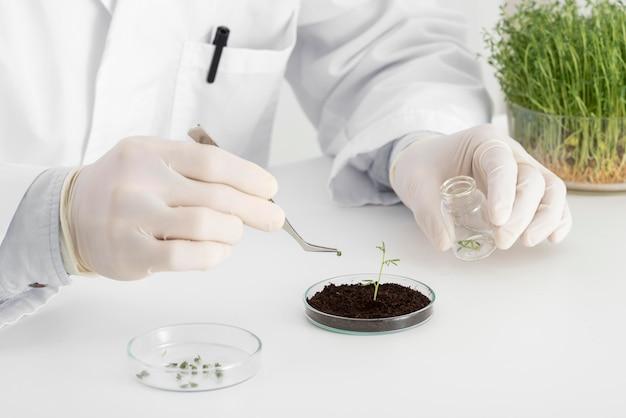Organic chemistry is a fascinating branch of science that deals with the study of carbon-based compounds, their properties, structures, and reactions. But what does that have to do with our daily lives, you may ask? Well, the answer is pretty much everything.
From the food we eat to the clothes we wear, organic chemistry plays a crucial role in shaping our everyday experiences. It helps us understand and manipulate various substances to create new materials, medicines, and technologies that enhance our quality of life. Whether it’s the detergents we use to clean our clothes or the plastics that make up our household items, organic chemistry is involved at every step.
In this blog post, we will explore the importance of organic chemistry in our daily lives, unravel the mysteries behind organic compounds, and discover how they impact our health, environment, and overall well-being. So buckle up and get ready to delve into the marvelous world of organic chemistry!

The Everyday Marvels of Organic Chemistry
Organic chemistry might sound daunting, like a subject reserved for lab coats and test tubes. But in reality, it’s all around us, shaping our daily lives in more ways than we realize. From the food we eat to the clothes we wear, organic chemistry plays a vital role, and it’s time we appreciate its everyday marvels.
Unleashing Flavors and Aromas
A Gastrochemical Adventure
Next time you savor a juicy burger or bite into a perfectly ripe strawberry, thank organic chemistry for the explosion of flavors and aromas. It’s this branch of chemistry that delves into the compounds responsible for tickling our taste buds. Carbohydrates, lipids, proteins, and countless other organic molecules are the unsung heroes behind the delightful explosions on our palates. So, the next time you’re blown away by a burst of flavor, take a moment to appreciate the intricate chemistry that made it possible.
Sustainable Solutions
Nature’s Laboratory
In an era where sustainability is imperative, organic chemistry offers a helping hand. Through innovative techniques, it enables us to find eco-friendly alternatives and reduces our reliance on harmful substances. Organic chemists work tirelessly to find greener methods for producing everyday essentials like fuels, plastics, and pharmaceuticals. Their research paves the way for a more sustainable future where nature and technology can coexist harmoniously.
The Fabric of Our Fashion
Dressing up Molecular Style
Organic chemistry even influences our fashion choices. Remember that comfortable cotton t-shirt you love? Well, you have organic chemistry to thank for it. Cellulose, a complex organic compound found in plants, is the key player in producing textiles like cotton. It’s the magic of organic chemistry that transforms plant fibers into the soft, breathable fabrics that keep us stylish and comfortable year-round. So, the next time you slip into your favorite outfit, give organic chemistry a nod of appreciation.
Medicinal Marvels
The Pharmacy of Life
Organic chemistry is also on the frontlines of advancements in medicine, contributing to the development of life-saving drugs and treatments. From antibiotics to painkillers, chemotherapy drugs to antidepressants, organic chemistry fuels the pharmaceutical industry with its intricate knowledge of molecular interactions. Countless lives have been improved and saved, all thanks to the tireless work of organic chemists unraveling the secrets of molecules and their healing potential.
The Sweet Science
Confectionery Chemistry
What makes chocolate so irresistible? Organic chemistry, of course! The delicate balance of fats, sugars, and other organic compounds creates the velvety smoothness and mouthwatering pleasure we all associate with chocolate. From the snap of a perfectly tempered bar to the melt-in-your-mouth sensation of a truffle, organic chemistry plays a starring role in our sweetest indulgences. So, the next time you savor a piece of chocolate, remember the hidden chemistry behind that delicious treat.
Organic chemistry might not always come to mind when we think about our daily routines, but its impact is undeniable. So, let’s take a moment to appreciate the science that enriches our lives, one molecule at a time.

FAQ: What is the Importance of Organic Chemistry in Our Daily Life?
What are the Five Essential Organic Compounds
Organic chemistry is the study of carbon-based compounds, and there are countless organic compounds out there. However, when it comes to the essentials, we can narrow them down to five main classes: alkanes, alkenes, alkynes, alcohols, and carboxylic acids. These compounds play vital roles in our daily lives, whether we realize it or not.
Is Water an Organic Compound
Ah, the age-old question! Water, my friend, is not an organic compound. Even though it consists of two hydrogen atoms bonded to one oxygen atom, it does not contain carbon. But don’t fret! Water may not be organic, but it’s still incredibly important for our existence.
Why Do We Have So Many Organic Compounds
Great question! The abundance of organic compounds stems from carbon’s unique bonding properties. Carbon atoms have the fantastic ability to form chains and rings with other carbon atoms, creating an endless array of possibilities. This incredible versatility gives rise to an astonishing number of organic compounds, each with its own set of characteristics and uses.
How Do You Recognize an Organic Compound
Ah, the telltale signs of an organic compound! Look out for carbon – the superstar of organic chemistry. If a compound contains carbon atoms, along with a few hydrogens (maybe some oxygens and nitrogens too), it’s likely organic. So keep your eyes peeled for those carbon-carbon bonds and you’ll be able to spot organic compounds like a pro!
Why Do You Think These Kinds of Organic Compounds are Very Important
Well, my friend, organic compounds are the backbone of life as we know it. They’re involved in everything from the food we eat to the medicines we take. Organic compounds have the power to create life-saving drugs, delicious flavors, and even fabulous fashion fibers. They’re basically the MVPs of the chemical world!
What is the Most Important Organic Compound
Ah, singling out one organic compound as the most important is like choosing a favorite ice cream flavor – it’s tough! But if we had to pick one, it would be good old glucose. This sweet molecule gives us vital energy and serves as the building block for many other compounds. Plus, it’s found in tasty treats like fruits and chocolate. Talk about a win-win!
Why is it Called Organic Chemistry
Ah, the origins of the name! Back in the day, scientists believed that organic compounds could only be obtained from living organisms. They thought a mysterious “vital force” was needed to create these compounds. But then some clever chemists showed that these compounds could be synthesized in the lab without any “vital force.” So, the term “organic” stuck around, even though it doesn’t necessarily involve anything living. Chemistry loves to keep us on our toes, doesn’t it?
What is the Importance of Organic Chemistry in Our Daily Life
Oh, where do I begin? Organic chemistry is like the unsung hero of our daily lives. From the moment we wake up until the time we hit the hay, organic compounds are there, working their magic. They give us the flavors in our food, the medicines that cure our ills, the clothes we wear, and so much more. They’re the quiet influencers behind the scenes, making our lives easier, tastier, and more comfortable. Organic chemistry truly impacts every corner of our daily existence, whether we realize it or not.
Now that you’re armed with a bit of organic chemistry knowledge, you’ll never look at your everyday life the same way again. So embrace the beauty of carbon compounds, my friend, and appreciate the fantastic world of organic chemistry that surrounds you!
Note: Please remove this note before publishing the blog post.
